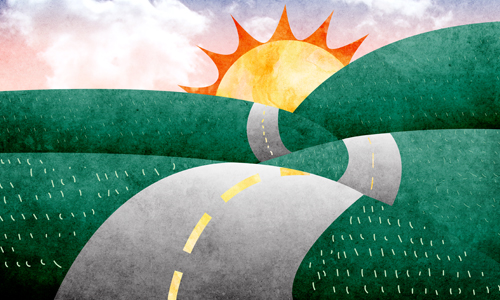
Stay in Your Lane!
Much of life is analogous to a road or journey. As the traveler, we move along, sometimes fast—sometimes slow, as we trek this thing called life. Perhaps some see it as Ralph Waldo Emerson did: “life is about the journey, not the destination.”
Educating children is also compared to a journey, according to the teachings of Proverbs. l’naar al pi darko: “Educate a child according to his/her way, so that even when he grows old he will not turn away from it.”
“Way” indicates a pathway. A road. A journey. This is a powerful statement. When people are supported on their journey, they’ll stick to it. They’ll own it.
Every child has his or her own way, their personal journey. The role of an educator is to figure out how to travel alongside children as they discover the world around them.
Children start to think long before their formal education begins; our job as parents and teachers is to help them think about their own thinking. Darko means finding his or her way to grow and develop—to become moral, spiritual beings serving their Creator.
This does not mean we don’t set academic goals for skills and knowledge, it means that we get onto their road and ride alongside them, as opposed to corralling all the children onto one main road and insist, quite literally, that it is “my way or the highway.”
Yet education is not just about facts, figures or skills. It’s also about what is called the “soft skills,” the social and emotional piece of development. And perhaps this is the trickiest road to navigate.
My sister and I were discussing the latest research out of Duke University concerning teen depression. Experts don’t hesitate when they say the most common source of worry and anxiety for teens today is social media. But is it really only teens? My younger, yet usually wiser, sister put this most succinctly: “We need to be driving in our own lane.” Focused. Straight. Darko.
What does it mean to stay in your own lane? Some people use this expression as a defensive posture when they are telling you to mind your own business. That’s not what my sister was saying; she was using it as a metaphor for how to stay focused on our own life’s journey. Easier said than done.
Staying in your own lane means different things to different people. It also changes at different stages in life.
It starts with training children at a young age not to focus on what another child has. For the young adults, it might be about not allowing social media and the chatter of friends to cause you to feel badly about yourself. It might mean staying hyper-focused on not even looking in another lane, so as not to be distracted. It means feeling empowered by your own life and knowing that you can only be sure that what is in your own lane, right in front of you, is reality. Whatever you might see “over there” could very well be a mirage.
As we age and learn to drive safely—and we do not get as easily distracted by the perceived better lives of our friends—it might just be about glancing over to the other lane and see how to help the other.
I know that I can get super-focused on my own lane and my own family. I don’t look left or right, and that’s not ideal either because it causes me to lose sight of those in another lane that might also need my attention. Do I stay so intent that I develop tunnel vision and lose sight of my surroundings?
When you learn to properly negotiate staying in your own lane, you feel better about yourself and are filled with less comparison anxiety. But it is a delicate balance.
At the end of Parshat Vayeitzei, there begins a new chapter that has only two verses and then abruptly stops; the rest of its 31 verses are read the following week in Parshat Vayishlach. In the second verse, it says: Yaakov halach l’darko—“Jacob went on his way.” He got up, and he began to move. Life is not meant to be stagnant. Move along.
This verse is in a tiny chapter at the end of the Torah portion, but it is significant. It is best known for being proclaimed ceremoniously each year after the High Holiday season, as a charge to infuse our daily lives with spirituality. We are meant to gather all of the holiness we have acquired throughout that time and take it with us as we head into the more mundane parts of daily life.
Yaakov halach l’darko . . . darko, that word again—“his road,” or as I like to call it, his own lane. Jacob went on his way.
Jacob denotes all of Israel; it is a plural connotation, yet “his way” is singular. We are many individual people who each have our own way, but we make up one single unit called “Yaakov.” We stay in our own lane while using the Torah as our road map. This is critical for much of our own character development, but the balance is that we also cannot forget that we do indeed belong to the whole. Looking into another’s lane makes sense at appropriate times.
Whether you take the long shorter way or the short longer way, make sure it is darko—your own individualistic way.
